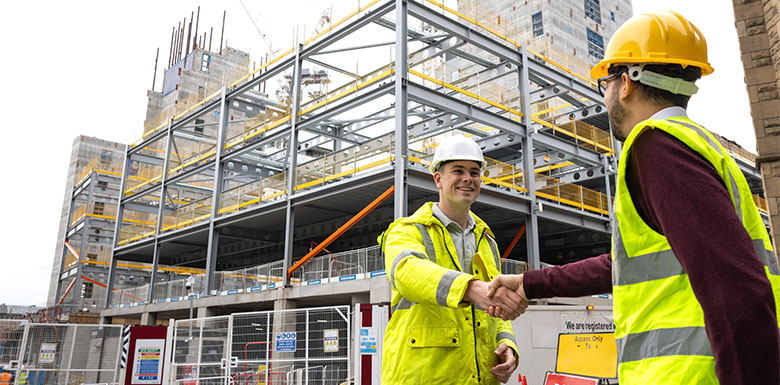Sustainability in construction: Tips for your business
 In this article
In this article
If you’ve been involved in the construction industry or any of its adjacent trades in the last few years, you’ve probably become aware of the growing importance of including sustainability practices in your work.
Be it using solely sustainable building materials, or reducing the carbon footprint of their supply chain, more and more UK construction businesses are turning towards sustainable construction practices – both to reduce costs and improve the reputation of their company in the eyes of eco-conscious customers.
So, if you’re looking for ways to make your construction business more sustainable moving forward – or you want to start a construction company in the near future – take a look at our guide below for tips and advice on the various sustainable construction methods other businesses are currently using.
What is sustainable construction?
At its heart, sustainable construction is all about using eco-friendly, renewable, recyclable, and recycled materials in the construction of new buildings and venues as a means of reducing carbon emissions and waste output within the wider construction industry.
However, there’s more to sustainable construction practices than using renewable materials alone. It also refers to the act of making every part of your business and projects as eco-conscious as possible.
From using environmentally friendly and local suppliers to educating yourself and your team on the best practices of green construction, sustainable construction involves all areas of your work – not just the physical act of building something itself.
Why is sustainable construction important?
With sustainable construction, the clue to its importance lies in the name. At the end of the day, sustainable construction methods are crucial to reducing the carbon output of the industry as a whole and driving us towards a greener future.
Sustainable construction methods are better for the environment and, in many cases, better for your business overall. Sustainable construction reduces reliance on fossil fuels, promotes the expansion and inclusion of greener spaces in and around new builds and, when done properly, can even make your business more profitable.
How can sustainable construction improve business profitability?
Although you might assume otherwise, sustainable construction practices have the potential to boost business profitability down the line – because in many cases, green construction methods offer cheaper, high-quality material alternatives, while also attracting a larger customer base in general.
Add to this the potential to save on overheads by making your business more energy efficient and less reliant on traditional fuel sources, and you’ll likely find yourself making savings in all aspects of your business operations.
Sustainable construction methods your business can use
There are a variety of different sustainable construction methods you can involve yourself with to align your business towards expected environmental standards. We recommend starting with the core ones we’ve outlined here as a good place to begin with:
1. Plan sustainability from the start
At the end of the day, sustainable construction needs to be incorporated into the entirety of your business – not just on a project-by-project basis – which means considering its implementation at each and every stage as you move forward.
From the planning and architectural stage of a new building to the disposal of waste at the completion of a project, take the time to think about how you can improve sustainability in all your business processes. This will let you plan their integration well in advance, rather than trying to work them in as and when their need arises.
2. Invest in environmentally friendly building materials
Perhaps the most important part of sustainable construction practices, making use of sustainable construction materials is an absolute must if you intend to make your business more environmentally friendly.
While you might not be able to complete every project using 100% sustainable materials, you should aim to involve the use of natural, low-emission, recycled, and reclaimed materials (woods, metals, insulation, concretes, etc.) as and where you can to reduce your business’s overall carbon footprint.
3. Properly dispose of work waste
Construction, by its very nature, produces a lot of waste, and the proper disposal of these excess materials is just as important as using them in the first place – the last thing you want is for all your work waste to end up in the local landfill.
Instead, make a note of the nearest recycling centres to your current project location and place of work so you can deposit them correctly at the end of the day or week. We’d also recommend making a precise plan of how much material you’ll need for your project and reusing what you can from previous builds to reduce waste output in general.
4. Make your business more energy efficient
Although a large portion of your work time will likely be spent out on construction sites, that’s no reason not to make your business itself more energy efficient. Whether this is through green electricity or more fuel-efficient equipment is up to you, but anywhere you can improve efficiency will go a long way to reducing your carbon emissions.
And such energy-saving measures can also be applied to your work site as well. Temporary solar generators can be used to power lighting instead of traditional power generations, and turning off unused vehicles instead of leaving them idling will save on fuel costs.
5. Practice eco-friendly landscaping
Speaking of being eco-friendly on your work site, carrying out eco-friendly landscaping before and after you start your work is very important for maintaining ecological balance, respecting wildlife habitats, and providing additional green spaces for the community.
Smart eco-landscaping can reduce erosion and provide a sturdier natural foundation for you to work with, while the replanting of trees and vegetation post-project can help local wildlife recover and adjust to the changes made to their habitat.
6. Don’t neglect your supply chain
While plenty of construction waste and emissions come as part of your work, just as much can be found in the supply and transportation of the materials you choose to use on a daily basis.
That’s why it’s so important to make use of locally sourced materials from eco-conscious suppliers to reduce the carbon output of your supply chain, as proper sustainability in the construction sector can only be practising responsible environmentalism in all areas.
7. Offer green building designs
Just because you’re operating a more eco-conscious business, that doesn’t mean you have to stop providing certain services to your customers. In fact, as a sustainable construction company, you can offer customers several additional ones – all of which you can use to market your construction business as an eco-friendly alternative.
From solar panel installation and passive solar window design for natural heating regulation, to natural ventilation setups and eco walls designed to disperse and absorb heat, take some time to research additional business services you can add to your repertoire.
8. Educate yourself and your team
Last but not least, the implementation of sustainable operations into your construction business can only be done properly by educating yourself and your team on the best practices within the industry.
By building a dedicated culture of sustainability among your staff and contractors, and establishing your business as a focal point in the construction sustainability sector, you can further boost your reputation among potential customers and get ahead of local competitors who are yet to engage in sustainable construction practises.
With these tips in hand, you should find the transition towards operating an eco-friendly construction company that much easier.





